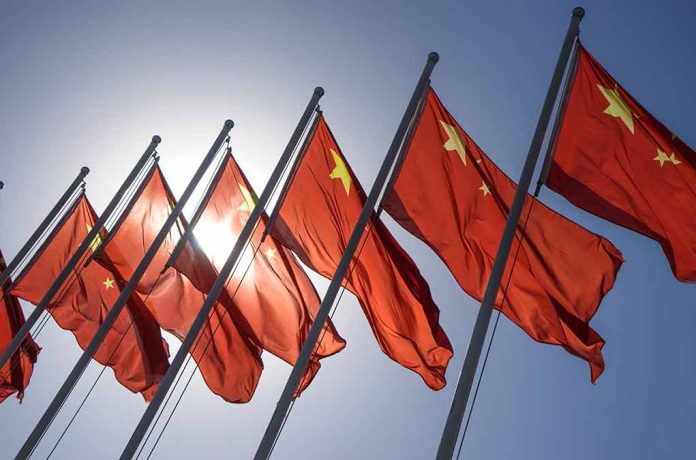
After years of diplomatic tension sparked by the 2018 arrest of a Huawei executive, Canada and China are rebuilding relations even as both nations grapple with President Trump’s trade tariffs, raising concerns about whose interests are truly being served.
Key Takeaways
- Canadian Prime Minister Mark Carney and Chinese Premier Li Qiang have agreed to regularize communication channels after years of diplomatic strain
- Both nations committed to addressing the fentanyl crisis collaboratively amid ongoing discussions about trade relations
- The diplomatic rift began with Canada’s 2018 arrest of Huawei executive Meng Wanzhou, which prompted China’s retaliatory detention of two Canadian citizens
- Both countries expressed concerns about President Trump’s tariff policies and voiced support for multilateralism and free trade
- Human rights issues, including China’s treatment of Uyghur Muslims and alleged election interference in Canada, remain significant points of contention
Diplomatic Reset After Years of Tension
Canada and China have taken formal steps to restore diplomatic communications after a prolonged period of strained relations. The announcement follows a recent call between Canadian Prime Minister Mark Carney and Chinese Premier Li Qiang, marking a significant shift in the countries’ diplomatic stance. Both leaders have committed to regularizing communication channels in an apparent effort to overcome the diplomatic crisis that began in 2018 with the arrest of Huawei executive Meng Wanzhou on Canadian soil, following a U.S. extradition request. The detention triggered a severe diplomatic standoff, with China retaliating by arresting two Canadian citizens on espionage charges.
“Mark Carney spoke with the Premier of China, Li Qiang. The leaders exchanged views on bilateral relations, including the importance of engagement, and agreed to regularize channels of communication between Canada and China,” stated the office of Canadian Prime Minister Mark Carney.
Acknowledging Past Conflicts
During their conversation, Premier Li openly acknowledged the troubled history between the two nations. “In recent years, China-Canada relations have faced unnecessary disturbances and encountered serious difficulties,” Li stated, referencing the diplomatic fallout that has hampered bilateral relations since 2018. The Chinese premier’s candid assessment indicates Beijing’s willingness to move beyond these difficulties. Despite this apparent openness to reconciliation, significant obstacles remain, including ongoing disputes over human rights concerns, particularly regarding China’s treatment of Uyghur Muslims and its interventions in Hong Kong, which Canada has repeatedly criticized.
Breaking: Trump slaps tariffs on Canada, Mexico, & China to combat Fentanyl crisis! 🇺🇸💊 Will this stop the drugs or spark a trade war? 🌎💥 #FentanylFight #TradeTensions
Trump's Tariff Strategy Targets Fentanyl Trade, Strains International Ties
Summary: President Donald Trump… pic.twitter.com/O2rYA7SzRR
— ILJUR – International League of United Reporters (@YSMILJUR) February 3, 2025
Fentanyl Crisis Cooperation
One notable area of agreement between the two countries involves combating the deadly fentanyl crisis that has devastated communities across North America. Both leaders committed to working together to address this epidemic, which has seen synthetic opioids, often manufactured with precursor chemicals from China, causing tens of thousands of overdose deaths annually. This cooperation represents a potential bright spot in otherwise complicated relations. The commitment comes as President Trump has repeatedly highlighted the fentanyl crisis as a national emergency and criticized countries that contribute to the flow of illegal drugs into the United States.
“Li is willing to work with Canada to jointly uphold multilateralism and free trade,” Li stated, indicating China’s desire to find common ground on global economic issues.
United Against Trump’s Tariffs
Another significant point of convergence between Ottawa and Beijing is their shared concern over President Trump’s aggressive trade policies. Both nations have been directly impacted by tariffs imposed by the Trump administration and have voiced their opposition to these measures. The topic reportedly featured prominently in discussions between Carney and Li, suggesting a potential alignment of interests against American protectionism. This common stance raises serious questions about whether Canada is pursuing a diplomatic strategy that undermines President Trump’s efforts to hold China accountable for unfair trade practices that have harmed American workers and businesses.
Unresolved Tensions Remain
Despite the diplomatic thaw, significant challenges persist in the Canada-China relationship. Allegations of Chinese interference in Canadian elections remain a contentious issue, though Beijing has consistently denied these claims. Canada’s criticism of China’s human rights record continues to be a source of friction. The call between Carney and Li took place at the Canadian prime minister’s request, demonstrating Ottawa’s eagerness to repair relations. China notably did not congratulate Carney following his Liberal Party’s surprise victory in April’s election, instead indicating a cautious openness to improving bilateral ties.
The renewed diplomatic engagement between Canada and China raises important questions about strategic alignment in an increasingly complex global environment. As President Trump continues to hold China accountable for unfair trade practices and intellectual property theft, Canada’s separate reconciliation with Beijing may undermine these efforts. Conservative observers will rightfully question whether this diplomatic reset serves North American interests or merely accommodates Chinese ambitions while failing to secure meaningful reforms in areas ranging from human rights to fair trade practices.




